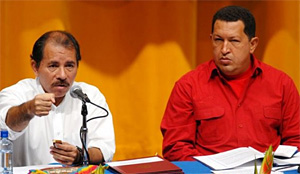 |
 |
 |
 News from Around the Americas | December 2007 News from Around the Americas | December 2007  
Latin America 2007: Best & Worst
 Latin Business Chronicle Latin Business Chronicle
go to original


| | Telecom company CANTV, Venezuela's largest private company, was nationalized in 2007. | 
| | Presidents Daniel Ortega of Nicaragua and Hugo Chavez of Venezuela. (Nicaraguan President's Office) | 
| | Colombia's state oil company Ecopetrol went public in September, the country's largest IPO ever. (Ecopetrol) | 
| | Ecuador's President Rafael Correa marked his first year in power by scaring investors and creating more political uncertainty. (Ecuador President's Office) | 
| | In October a majority of Costa Ricans said yes to CAFTA. (ICT | 
| | The Panama Canal held groundbreaking on the $5.2 billion expansion in September 2007. (ACP) |
2007 was a year when politics - especially Hugo Chavez - dominated much of the business news out of Latin America. However, there were also other key events during the year. Latin Business Chronicle singles out the five best and five worst events of the year.

FIVE BEST EVENTS

• Bovespa's IPO. On October 24, 2007, the Sao Paulo stock exchange Bovespa launched its own IPO, raising a whopping $3.7 billion. That was the largest IPO ever in Brazil, which has seen a wave of IPO's the past few years.

• Mexico Reforms. Mexican President Felipe Calderon spent his first year implementing tax and pension reforms, announced a $250 billion, five-year infrastructure plan and launching an aggressive campaign to boost security. The measures will benefit Latin America's second-largest economy and the top U.S. trade partner in the region.

• Ecopetrol IPO. On September 25, Colombia's state oil company Ecopetrol completed its first round of IPO, raising $3.3 billion. That's the country's largest IPO ever and the second-largest in Latin America in 2007.

• Costa Rica's CAFTA Approval. On October 7, 2007, a slim majority - 51.6 percent - voted in a referendum to approve the country joining CAFTA. A no vote would have been a major blow to the country's pro-business president Oscar Arias and sent a negative signal to foreign investors. With CAFTA, Costa Rica will open its telecom and insurance sectors to competition.

• Panama Canal Expansion. On September 3, 2007, the Panama Canal officially held the groundbreaking ceremonies for the historic $5.2 billion, multi-year expansion program aimed at making it more competitive.

• U.S.-Peru FTA Signed. On December 14, 2007, President George W. Bush signed into law the U.S.-Panama free trade agreement after it had been approved by the U.S. Congress in November and December. The FTA approval follows nearly two years of delays in getting approval from U.S. lawmakers. The approval spurred optimism that the U.S. Congress would follow in 2008 with approvals for the Colombia and Panama FTA's as well.

FIVE WORST EVENTS

• Nationalization of CANTV and EDC in Venezuela. On January 8, 2007, President Hugo Chavez announced that he planned to nationalize the telecom company CANTV and electricity company EDC, the two largest private companies in the country. The news were seen as the latest examples of Chavez' plans to implement a socialist economy at the expense of private companies and foreign investors.

• Colombia FTA Delay. The U.S. Congress failed to approve the U.S.-Colombia free trade agreement during 2007 despite strong support from U.S. companies like General Motors and Coca-Cola and former Clinton Administration officials like White House chiefs of staffs Leon Panetta and Thomas "Mack" McLarty. The pact, reached in February 2006, is seen as far more important for U.S. exports than the U.S.-Peru free trade agreement lawmakers did pass towards the end of 2007.

• Ecuador's Radicalization. As if Ecuador couldn't get worse, President Rafael Correa decided to spend his first year in power attacking everyone from foreign oil companies to opposition lawmakers. Among other things, he hiked oil royalties to a whopping 99 percent, prompting a series of disputes with foreign oil companies (See Ecuador Oil: More Trouble Ahead). The result? Falling oil production and one of the weakest GDP expansions in Latin America.

• Nicaragua's Radicalization. Although he had vowed not to return to past policies that spurred capital flight, hyper inflation and economic recession, Nicaraguan President Daniel Ortega spent most of his first year trying to scare away foreign investors. The worst case was the August 18 confiscation of a fuel-storage terminal owned by ExxonMobil. (See Nicaragua Confiscation Illegal, Unsafe). The terminal was later returned to the company, but the government said it wanted to negotiate a permanent solution allowing it to use the terminal to store Venezuelan oil. Meanwhile, Ortega continued his attacks against Spanish energy company Union Fenosa, at one point likening the company to the mafia and accused it of using "gangster methods" and corruption. (See Dealing With Latin Populists).

• Treatment of Botnia. The Finnish pulp company only wanted to build a $1.2 billion mill in Uruguay (the country's largest foreign investment ever), but has had to face a wave of problems, mostly caused by Argentina's government and Argentine environmental activists who claim the mill will contaminate despite assurances from The World Bank, international experts and Uruguayan authorities of the opposite. On November 12, 2007 the company started its first production, but on December 10, Argentina's new president Cristina Fernandez signalled that she planned to continue with the harassments. And a few weeks later an Argentine judge demanded that four key Botnia officials present testimony in a new legal suit against the company brought by an Argentine province. | 
 | |
 |



